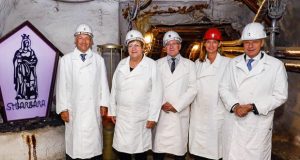Coal-fired power stations can assume the task of system stabilisation. This was shown in the Deloitte study “Analysis of the flexibility of coal-fired power stations for the integration of renewable energies in Germany” compiled on behalf of the German Association of Coal Importers (VDKi), Berlin (Deloitte Finance, November 2019), with a “What if” scenario. From a purely technical perspective, the existing coal-fired power plants in Germany (2018) could absorb and integrate increasing shares of variable renewable energies of 50 %, 60 % or 70 %, without threatening the reliability of the power supply. The average utilisation of the existing coal-fired power plants (2018) would drop to slightly over 30 % in the 50 % renewable energies scenario and to around 20 or 15 % in the scenario 60 % or 70 % renewable energies.
- In “slack periods”, i. e. periods with limited power from wind turbines and solar panels, with a duration from one to three days, coal-fired power plants generate twice as much electricity than on an average day if the proportion of renewable energies is 50 %, and 3.5 times more electricity if the proportion of renewable energies is 70 %.
- Germany becomes the net importer during the “slack periods”. The scope for offsetting through higher imports is limited by the availability of available plants in the neighbouring countries of Germany and the overloading of the interconnectors.
- Almost three quarters of the installed power plant fleet produce heat and electricity simultaneously (CHP). Most CHP plants can change flexibly between heat and power as long as the electricity generation is not restricted by the heat requirement in the cold season. Upgrades of heat accumulators can improve the operational flexibility of coal-fired power stations.
The study did not focus on very low gas prices for power plants. According to experts, the current price level will not remain this way over the long term. Based on a current market evaluation of the gas sector, there will be no suitable conditions for cost-effective continued operation of existing current-regulated gas power plants beyond autumn 2020. The scope of the Deloitte study was limited to a “What if” scenario. It must also be noted that only highly efficient gas and steam power stations are to be promoted within the framework of the CHP. Besides coal-fired power stations, open gas turbines and gas motors may be worth considering for flanking the further expansion of renewables in slack periods and in the cold season, but modern coal-fired power plants must be assessed more favourably than open gas turbines with respect to the emissions. Considering the emissions across the entire causal chain from the borehole/mine through to the power plant, coal is on par with natural gas, as current studies show. Therefore, open gas turbines or gas motors should only be built where power plant output is required for grid-related reasons which cannot be provided by existing coal-fired power plants. The VDKi therefore calls on all political stakeholders to use the capacities of the flexible coal-fired power plants in system stabilisation and thus the integration of renewable energies within the framework of the energy revolution and help shape the discontinuation of coal-fired generation. (VDKi/Si.)

